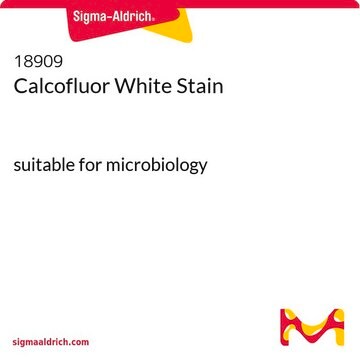D9542
DAPI
for nucleic acid staining
Sinónimos:
4′,6-Diamidino-2-phenylindole dihydrochloride, 2-(4-Amidinophenyl)-6-indolecarbamidine dihydrochloride, DAPI dihydrochloride
About This Item
Productos recomendados
grade
for molecular biology
assay
≥98% (HPLC)
form
powder
technique(s)
transfection: suitable
solubility
H2O: 20 mg/mL
PBS: insoluble
ε (extinction coefficient)
30 at 263 nm in H2O at 1 mM
fluorescence
λex 340 nm; λem 488 nm (nur DAPI)
λex 364 nm; λem 454 nm (DAPI-DNA-Komplex)
suitability
suitable for fluorescence
storage temp.
2-8°C
SMILES string
Cl.Cl.NC(=N)c1ccc(cc1)-c2cc3ccc(cc3[nH]2)C(N)=N
InChI
1S/C16H15N5.2ClH/c17-15(18)10-3-1-9(2-4-10)13-7-11-5-6-12(16(19)20)8-14(11)21-13;;/h1-8,21H,(H3,17,18)(H3,19,20);2*1H
InChI key
FPNZBYLXNYPRLR-UHFFFAOYSA-N
¿Está buscando productos similares? Visita Guía de comparación de productos
Categorías relacionadas
General description
Application
- DNA staining in agarose gels
- analysis of changes in DNA during apoptosis
- detection of mycoplasma
- photofootprinting of DNA
- immunofluorescent staining of cells
DAPI has been used:-
- in rapid monitoring of microbial contamination
- in chromosomal banding technique
- in detection of apoptotic cells
- in fluorescence microscopy to track the DisA (DNA integritiy scanning protein) movement on Bacillus subtilis DNA
- to stain mature pollen grains(0.5 mg/ml)
Biochem/physiol Actions
Caution
related product
signalword
Warning
hcodes
Hazard Classifications
Skin Irrit. 2 - Skin Sens. 1A - STOT SE 3
target_organs
Respiratory system
Storage Class
11 - Combustible Solids
wgk_germany
WGK 3
flash_point_f
Not applicable
flash_point_c
Not applicable
ppe
Eyeshields, Gloves, type N95 (US)
Certificados de análisis (COA)
Busque Certificados de análisis (COA) introduciendo el número de lote del producto. Los números de lote se encuentran en la etiqueta del producto después de las palabras «Lot» o «Batch»
¿Ya tiene este producto?
Encuentre la documentación para los productos que ha comprado recientemente en la Biblioteca de documentos.
Los clientes también vieron
Artículos
Cell cycle regulates vital processes like DNA repair, cancer prevention. Four stages: G1, S, G2, M. NTPs don't permeate membranes.
Cell cycle regulates vital processes like DNA repair, cancer prevention. Four stages: G1, S, G2, M. NTPs don't permeate membranes.
Cell cycle regulates vital processes like DNA repair, cancer prevention. Four stages: G1, S, G2, M. NTPs don't permeate membranes.
Cell cycle regulates vital processes like DNA repair, cancer prevention. Four stages: G1, S, G2, M. NTPs don't permeate membranes.
Protocolos
ICC Cell Capture Imaging Reagent simplifies imaging, ideal for rare cell and low cell count samples.
ICC Cell Capture Imaging Reagent simplifies imaging, ideal for rare cell and low cell count samples.
ICC Cell Capture Imaging Reagent simplifies imaging, ideal for rare cell and low cell count samples.
ICC Cell Capture Imaging Reagent simplifies imaging, ideal for rare cell and low cell count samples.
Contenido relacionado
Step-by-step protocol for generating apical-out human gut organoids for microbiome, ADME/Tox, viral and gastrointestinal related disease research. See the complete organoid culture protocol.
Nuestro equipo de científicos tiene experiencia en todas las áreas de investigación: Ciencias de la vida, Ciencia de los materiales, Síntesis química, Cromatografía, Analítica y muchas otras.
Póngase en contacto con el Servicio técnico












